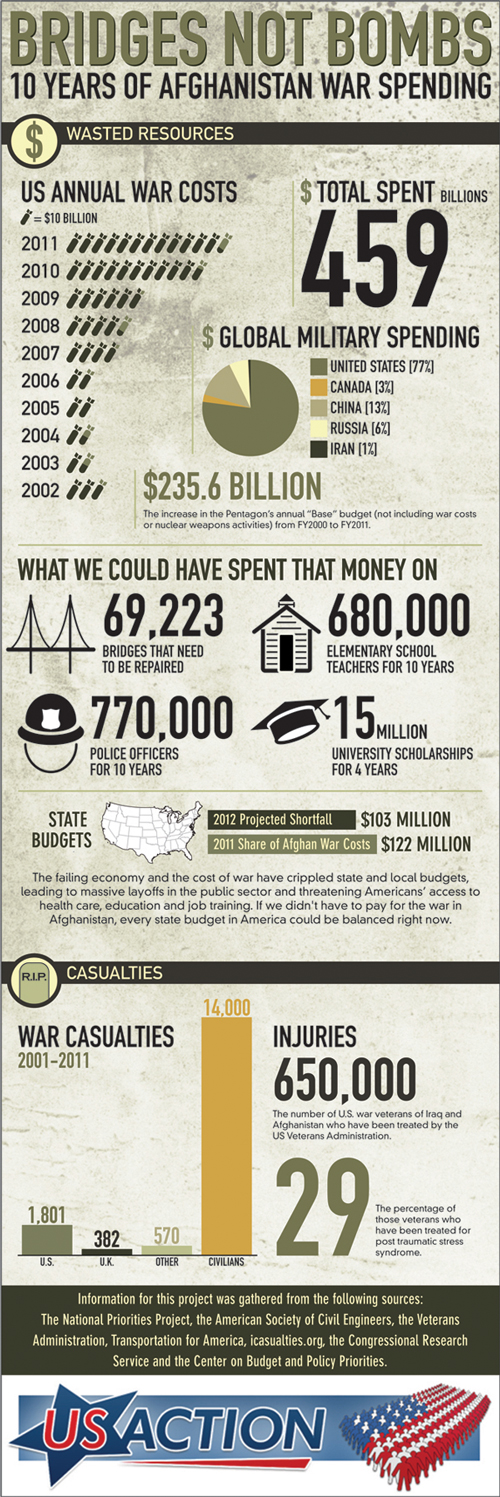Monday, October 31, 2011
"Let's live this life honestly ..."
This is inspiring-- and sweet. Just because gay marriage is legal and much affirmed in New York and Massachusetts doesn't mean the struggle for equal rights under law is over. You can still face arrest for quietly requesting a marriage license in some places.
North Carolina will vote on a constitutional amendment to outlaw same sex marriage in May 2012. Gay marriage is already barred by legislative enactment but opponents -- Republicans mostly -- want to add a ban to the state's fundamental law.
Via The Lead.
Sunday, October 30, 2011
Occupy Ocean Beach
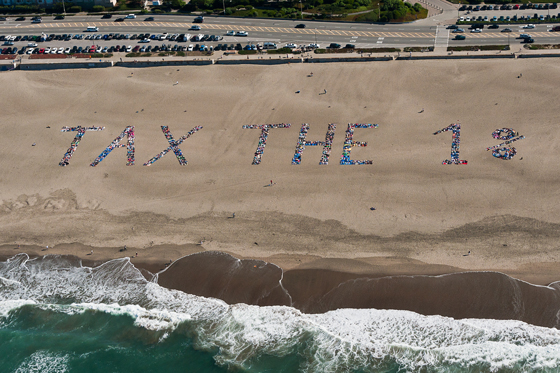
Saturday, October 29, San Francisco. That's about 1000 people with a message. A friend, her two dogs, and I were right there where the leg meets the crossbar in the second "T". Mayoral candidate Supervisor John Avalos was somewhere in the "A". Supervisor Eric Mar who represents this bit of beach was somewhere -- I know because I saw him later.
More here. Photo ©2011 John Montgomery.
Saturday, October 29, 2011
Saturday scenes and scenery: a visit to #OccupySF
Peaceful coexistence prevails amid campers, tourists.
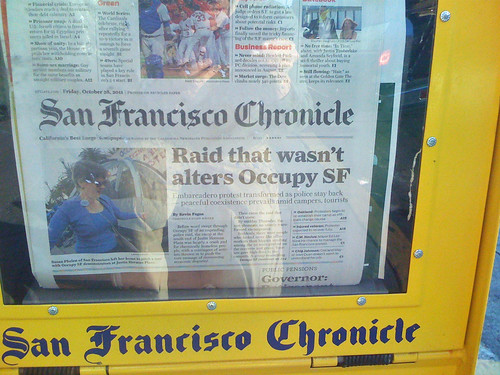
I didn't expect the Chron to go all sweetness and light about OccupySF. The Chronicle seldom reports positively on local protests.
The calm followed an alarm on Wednesday night when hundreds turned up to meet any effort by the city to remove the encampment.Suddenly, there were people who looked more like office workers than hippies strolling among the 50 tents pitched on the concrete and grass. Tourists gave high-fives to the campers. A group resembling yoga instructors set up a huge rug and spent the afternoon meditating.
I guess that interim Mayor (and current candidate) Ed Lee didn't want to be the target of the kind of storm of civic condemnation from all sides that Oakland MayorMore than 300 protesters gathered Wednesday night after word swept through the camp that the mayor and police force would make good on warnings to clear the tents out because of what they said were sanitation and illegal camping violations. By midnight, demonstrators had been joined by a phalanx of union leaders and politicians, including two mayoral candidates, Supervisor John Avalos and state Sen. Leland Yee.
Police with batons and helmets gathered near the plaza, and the protesters girded for passive resistance. But the raid never came.
I had some time on Friday to drop by OccupySF.
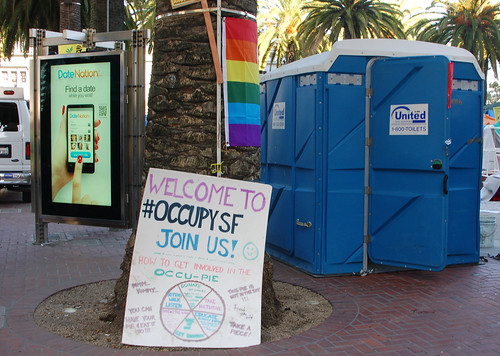
Certainly the folks at the encampment appear organized and friendly. With a little initiative, it wouldn't be hard to find a way to get involved.
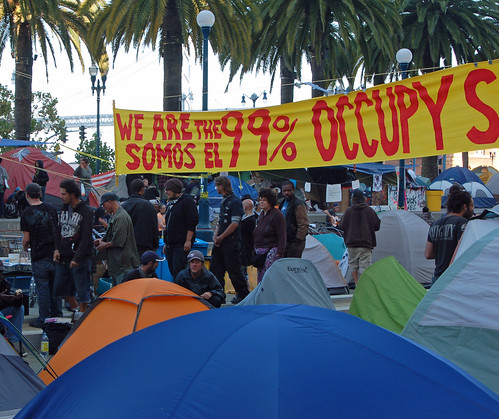
Somebody had brought in some wrapped sandwiches. Folks lined up quietly.
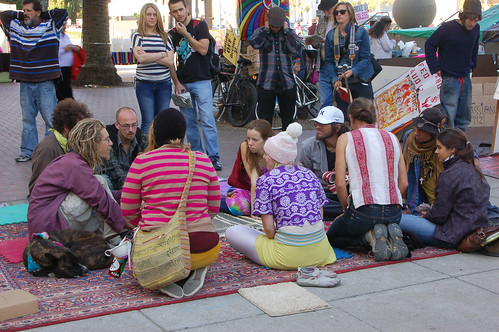
Elsewhere earnest conversations were underway.
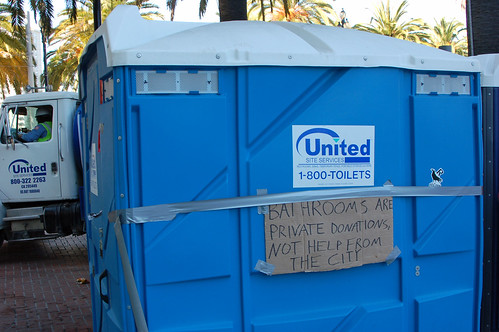
This explanatory note was the most concrete expression of animus between Occupiers and the city authorities. The bathrooms are private donations, not help from the city. They were being pumped out as I arrived.
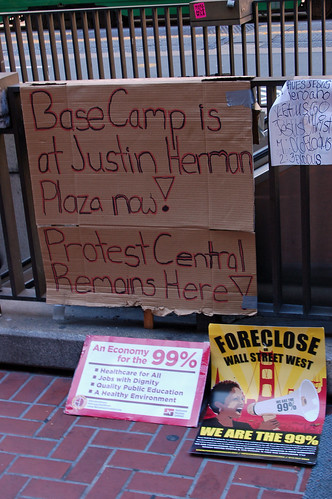
Half a block down Market Street in front of the Federal Reserve Bank, a small band reminded passersby why the Occupiers had come to this place.
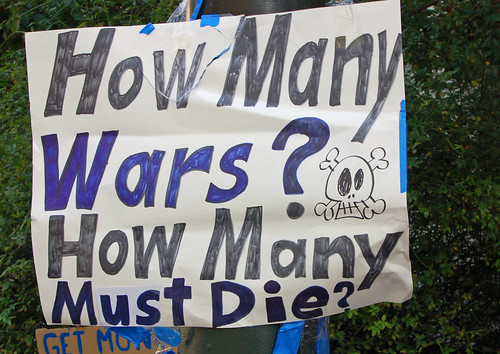
Having devoted countless hours to working to end current U.S. wars, it was good to see that turning away from wars is one theme here.
I feel precariousness, a mix of anxiety and hope, when I look in on the Occupiers. For the moment, this is a sort of peaceable kingdom, but for how long? What happens when the Pacific storms blow in? What happens after the mayoral election when the city authorities will likely feel more empowered to roust the encampment? Can an embattled motley community keep the focus on the system's failure to work for the 99 percent or will this devolve into a nasty fight about police brutality?
I wouldn't want to live where these folks are; I do my political agitation in other venues. But they make me glad. I'm glad for the Occupiers because they've found a way to bring their awareness of their own exclusion into full view -- and to make common cause with most all the rest of us. I'm glad for the nation because we're finally talking about what matters: how to make a wealthy economy work for all of us, not just the greediest.
Friday, October 28, 2011
What NOT to wear for Halloween

Students Teaching About Racism in Society, a student organization at Ohio University, thought up this campaign.

You can find the originators here.


Via Angry Asian Man
Thursday, October 27, 2011
Nasty politics past
The Bork fight, in some ways, was the beginning of the end of civil discourse in politics. For years afterward, conservatives seethed at the “systematic demonization” of Bork ... The anger between Democrats and Republicans, the unwillingness to work together, the profound mistrust — the line from Bork to today’s ugly politics is a straight one.
 Plueeze ... acrimonious politics didn't begin in 1987.
Plueeze ... acrimonious politics didn't begin in 1987.Any doubts about that would be dispelled by even a cursory glance at, for example, the politics of the early 1950s. In that time, Republicans painted Democrats and anyone else who disagreed with them, often falsely and gleefully, as dangerous disloyal agents of Communist Russia. One of the stories of that witch hunt is at the core of American Prometheus: The Triumph and Tragedy of J. Robert Oppenheimer by Kai Bird and Martin J. Sherwin. Oppenheimer was a brilliant student of physics, an engaging instructor of physicists at Berkeley and Cal Tech, then director of the Los Alamos project to develop the A-Bomb during World War II. After the war he remained the country's most famous scientist and expressed (quite muted) qualms about the emerging policy of mutually assured destruction by thermo-nuclear stand-off embraced by the Washington "security" establishment of his day. His political enemies dug up his leftish political commitments of the 1930s; he apparently had thought unions, care for anti-fascist refugees, and racial equality were good patriotic ideas, at least for awhile. This was enough to get him branded "a pink" and, after kangaroo court proceedings, to remove his security clearance, driving him out of political discourse.
American Prometheus is a long book and for my tastes expends far too many words on the minutiae of the charges against Oppenheimer. At this remove, the ins and outs of who met with who, when, and who told what FBI agent bent on getting a conviction what, just don't matter much. Oppenheimer comes across as a man too immobilized by ambiguities to survive bureaucratic trench warfare over policy. He nonetheless hoped his intellectual eminence would protect him in the crunch. It didn't -- politics turns not so much on being right as on assembling enough force, within civilized rules, to make right reality. There are democratic ways to make those fights; Oppenheimer was out of his element and, as this biography suggests, perhaps tempermentally out of any element.
Oppenheimer's nemesis in his loyalty hearing was Lewis Strauss, a Republican hawk then chairman of the Atomic Energy Commission. Democrats took revenge on Strauss in 1957 when President Eisenhower tried to appoint him Commerce secretary; the Senate rejected the nomination.
The one figure among the many luminaries in Oppenheimer's circle who stands out as wise and measured was Albert Einstein. This refugee from German Nazism was a fellow at the Institute for Advanced Studies at Princeton where Oppenheimer was director at the time of his hearing. They were not close, but there was mutual respect between the two physicists. Like Oppenheimer, he feared that the destructive power that their scientific discoveries had made possible might destroy the civilization they both valued and had fought to preserve. But unlike Oppenheimer, Einstein refused to be intimidated and, if that disqualified him for influence, accepted that he had done his best. McCarthyism -- the whole apparatus of "security" inquisitions -- reminded him of the Nazis. Asked about Oppenheimer's trial before a loyalty board, he answered
"The trouble with Oppenheimer is that he loves a woman who doesn't love him -- the United States government. . . . The problem was simple: All Oppenheimer needed to do was go to Washington, tell the officials that they were fools, and then go home."
Maybe that's what Nocera thinks Bork should have done: go to the Senate, tell the Judiciary Committee they were fools, and then go home. Actually he did do something rather like that; at least he certainly came off as an arrogant legal know-it-all. By a quirk of my employment in 1987, I was able to listen to radio broadcasts of the Bork hearings in their entirety. They were a fascinating schooling in the law -- and politics. I emerged very glad that Bork wasn't confirmed; he stood for warping law away from equalizing the chances of the poor and the excluded and toward the service to the rich and comfortable. Not my kind. I don't think there was anything wrong in letting the country in on what he stood for; momentarily, a majority of us didn't want that. Too bad if Republicans and Nocera nurse a grudge.
Wednesday, October 26, 2011
The president came to town
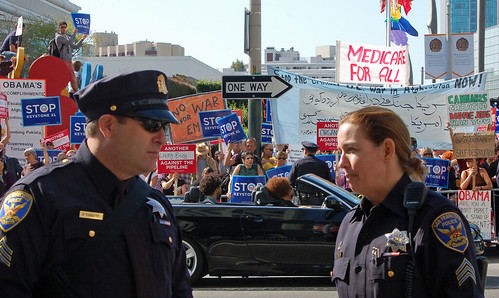
... and the people massed outside his $7500 a plate fundraising luncheon.
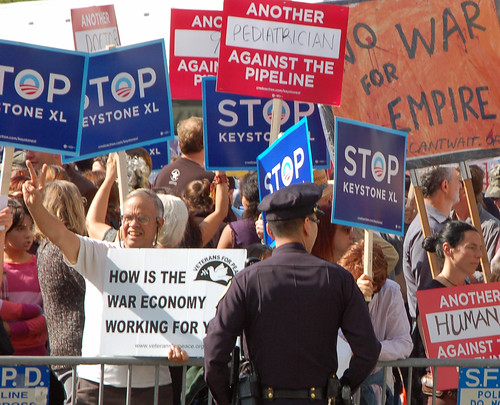
The polluting Tar Sands pipeline, health care, and the endless wars dominated the signage.

Protests at presidential fundraisers aren't just for dirty hippies anymore.
I wonder if anyone is listening. Somehow I doubt it.In a powerful display of profound disappointment with President Obama, some of the Democratic Party's biggest donors gathered Tuesday - not inside his tony San Francisco fundraiser at the W Hotel, but outside on the sidewalks carrying signs in protest of his policies.
"I don't even know what he stands for," said Susie Tompkins Buell, a co-founder of the Esprit clothing company and one of the most generous Democratic Party donors in the nation - instrumental in backing such powerhouse progressive organizations as the Democracy Alliance and Media Matters.
... Her goal: to urge Obama to stop the Keystone XL pipeline, a proposed 1,700-mile underground conduit linking the tar-sand fields in Alberta, Canada, to Texas refineries. Environmentalists say the pipeline would result in untold environmental damage. "I think this is a huge issue about our future, about the planet, not just America," she said. "And he needs to be a leader ... to have the awareness of it. To fight for it."
... "I'm not writing a check to the president until he does something to stop the Keystone pipeline," said Anna Hawken McKay, wife of Rob McKay - a wealthy philanthropist whose father founded the Taco Bell restaurant empire. As she stood on the sidewalk with other protesters, McKay vowed to be part of a protest of 5,000 Americans who will circle the White House on Nov. 6, a year to the day from the 2012 election.... "If he says yes (to Keystone), I won't give him money," said Michael Kieschnick, president and co-founder of CREDO Mobile and Working Assets, which has donated $60 million to progressive causes, as he stood outside the W Hotel. ...

Warming Wednesdays: 7 Billion and counting

Late this month, some human baby will be the 7 billionth living human on the planet, according to U.N. researchers. Maybe there are just too many of us and we're doomed. Some think so. Others take a more nuanced view, even while recognizing that humans have caused climate change, mass extinctions and soil and water depletion.
Thinking about population increase reminded me of when I first encountered discussions of its implications for human society. In the early 1960s I read economist and historian Robert Heilbroner's account in The Worldly Philosophers of the Rev. Thomas Malthus' dire 1798 predictions human misery arising from our unstoppable instinct to procreate. Heilbroner's summation is still interesting:
By that last, Heilbroner is suggesting that recognition of the paradox of disastrous excess abundance (ill-distributed at that) led to the visions of early socialists and eventually of the communist experiment.... what [Mathus'] essay on population said was that there was a tendency in nature for population to outstrip all possible means of subsistence. Far from ascending to an ever higher level, society was caught in a hopeless trap in which the human reproductive urge would inevitably shove humanity to the sheer brink of the precipice of existence. Rather than headed for Utopia, the human lot was forever condemned to a losing struggle between ravenous and multiplying mouths and the eternally insufficient stock of Nature's cupboard, however diligently that cupboard might be searched. ... In one staggering intellectual blow Malthus undid all the roseate hopes of an age oriented toward self-satisfaction and a comfortable vista of progress.
... It was no small achievement for [Malthus along with economist David Ricardo] to convince the world that it was living in a fool's paradise. But they did; and so convincing was their proof that men sought to find a way out for society, not within the framework of the supposed natural laws, but in defiance of them.
Malthus' recognition that all this growing productivity -- a capitalist society that allows a higher fraction of born humans to survive and consequently to disrupt all existence on the planet -- leads straight to our current need to realize we now live in the Anthropocene. It's up to us humans to organize ourselves and our environment -- for survival or for destruction.
As is often the case, the online magazine Grist, whose logo for a population feature I've cribbed above, offers some of the most thoughtful commentary on our predicament. Over and over, its authors insist that bringing human population numbers into harmony with the planet's carrying capacity is all about empowering women. Here's Laurie Mazur:
Yes, forward is the only way we have. Check out the entire Grist feature on surpassing 7 billion humans.The difference between 8 billion and 16 billion is all about women's rights. Fertility rates have fallen in most of the world's countries, but they remain high where women's status is low.
Less than one-fifth of the world's countries will account for nearly all of the world's population growth this century. Not coincidentally, those countries -- the least developed nations in sub-Saharan Africa, south Asia, and elsewhere -- are also where girls are less likely to attend school, where child marriage is common, and where women lack the means and the power to make their own decisions about childbearing.
... The numbers remind us, also, that the sustainable, resilient world we seek is in the future, not in the past. We can't go back, nor would we want to. We can, however, go forward -- by curbing our environmental impact, by advancing the rights of women, and by unleashing the intelligence and creativity of every one of the planet's nearly 7 billion citizens.
Tuesday, October 25, 2011
Inventing an exceptional democracy
 Nationalism, as an "ism" carrying the implication of an exclusive attachment to a particular country, has never quite worked for me. I'm fond of this place of my birth and some of its history, but it never occurred to me this was all there is. Probably relatedly, I'm instinctively suspicious of the idea of a "national character" -- aren't most people more complicated creatures than the phrase implies?
Nationalism, as an "ism" carrying the implication of an exclusive attachment to a particular country, has never quite worked for me. I'm fond of this place of my birth and some of its history, but it never occurred to me this was all there is. Probably relatedly, I'm instinctively suspicious of the idea of a "national character" -- aren't most people more complicated creatures than the phrase implies?Historian Gordon S. Wood's Empire of Liberty: A History of the Early Republic, 1789-1815 is a grand, comprehensive, inclusive story of this country's early years -- a picture that calls my skepticism about an enduring "national character" into question. It is fascinating.
The title phrase -- "empire of liberty" -- is an expression used more than once by Thomas Jefferson without irony, in fact with vast enthusiasm and hope. At times he was referring to the western territories he acquired as President with the 1803 Louisiana Purchase that made for a continent spanning nation. Other times he seems to have meant the young Republic itself. There was no contradiction in his thinking between "empire" -- which many of us scorn as implying military occupation and repression and "liberty" -- a polity of expanding human freedom. No wonder this sometimes seemed a confused country. That contradiction has lived among us from the get-go.
This sprawling book defies easy summary, but I did want to highlight a theme that has implications for current struggles. Woods portrays those early years of the nation as the era when the idea of a "middle class" society superseded European notions of class stratification. Until perhaps the immediate present, the belief that this was a middle class nation in which hierarchies were fluid, most people lived neither at extremes of wealth or poverty, and industrious people had a chance formed part of the national psyche. It is interesting to read how this looked back then.
It turns out there was both a material and an intellectual support for this confidence:In America, wrote Benjamin Franklin in one of the many expressions of the idea of American exceptionalism in these years, "a general happy Mediocrity" prevailed.
Over the decades covered by this volume, rule by people who were neither "gentlemen" nor "commoners" but rather "middling" folk flowered. The Founders of a hallowed memory were actually mostly slave-holding aristocrats, so creating the national mythology required lionizing another improbable figure. The "middling" sort went looking for their own champion:... White Americans enjoyed the highest standard of living in the world, and goods of all sorts were widely diffused throughout the society.
Most important of all, America was the premier land of liberty. The Americans had always been a vigilant people, jealous of their liberty and, as Edmund Burke had noted, snuffing tyranny in every tainted breeze. They knew -- the English radical Richard Price told them -- that "a Spirit," originating in America, was arising in the Western world. This spirit promised "a State of Society more favourable to peace, virtue, Science, and liberty (and consequently to human happiness and dignity) than has yet been known.... The minds of men are becoming more enlighten'd, and the silly despots of the world are likely to be forced to respect human rights and to take care not to govern too much lest they should not govern at all."
They started paying elected representatives a living wage and thereby invented professional politicians. The rest is history ...If the middling artisans and entrepreneurs who were coming to dominate Northern American culture in the early nineteenth century were to find among the Revolutionary Founders a hero they could relate to, only Benjamin Franklin, the former printer who had risen from the most obscure origins to worldly success, could fulfill their needs. Only Franklin could justify the release of their ambition.
...Franklin emerged for businessmen everywhere as the perfect model of the "self-made man," struggling by himself to rise from humble origins in order to achieve wealth and respectability. Haughty Federalists could only shake their heads in disgust ...
The "self-made man" became such a familiar symbol for Americans that its original novelty has been lost. Of course, there had always been social mobility in Western society, at some times and in some places more than others. Eighteenth-century Americans had always experienced a good deal of it. But this social mobility in the past generally had been a mobility of a peculiar sort, an often sponsored mobility in which the patronized individual acquired the attributes of the social status to which he aspired while at the same time he tried to forget and disguise the lowly sources from whence he had come. As indicated by the pejorative terms -- "upstarts," "arrivistes,"' "parvenus" -- used to disparage those participants unable to hide their rise, social mobility traditionally had not been something to be proud of.... independent mobile men were bragging of their humble origins and their lack of both polish and a gentleman's education. They had made it, they said, on their own, without family influence, without patronage, and without going to Harvard or Princeton or indeed any college at all. For many Americans the ability to make and display money now became the only proper democratic means for distinguishing one man from another.
...If indeed the Americans had become one homogeneous people and the people as a single estate were all there was, then many Americans now became much more willing than they had been in 1789 to label their government a "democracy."
Obviously I found all this quite fascinating. As I did, you may once have skimmed over the history of this period lightly in some long past class -- it bears revisiting.
Monday, October 24, 2011
Ranked-choice voting is an anti-democratic gimmick

This time around, for what amounts to the first time in a broadly contested open race, the "ranked-choice voting" system (RCV) will determine who gets to be mayor. RCV is also called "instant run off voting" -- the picture is the postcard the Elections Department sent voters to explain it.
Ranked-choice voting is a deeply anti-democratic, deeply foolish, electoral boondoggle much loved by math nerds and naive "good government" types. Instead of figuring out which candidate best represents your hopes and desires in an elected role, casting your ballot for that candidate, and living with whoever gets the most votes, you get to list three choices in order of preference and never really know who, if anyone, got your vote unless you are willing to sort through mountains of math. What kind of election is that?
Conservatives like RCV because it results (mathematically, though not factually) in a victor with "majority" support without the expense of a run off. We used to put the top two candidates in multi-candidate races through a run off vote in early December, a ghastly afterward to a long electoral season that did at least produce a winner who the majority of tired voters chose. It was expensive and no fun, but seemed fair enough. RCV cuts the expense and that is a good, but not necessarily the only good.
Liberals like RCV because it plays to one of our dumber preferences: it tries to take sharp conflict of views out of politics. It promises less mud-slinging and partisan attacks. Because under RCV any candidate in a broadly contested election has to round up some second and third place votes to have a chance, pointing out the faults of the other guy can backfire -- some of his supporters may hold a grudge and not give you a second. There's a huge incentive to muddy clashing positions.
This is anti-democratic (small "d"). Democracy empowers voters to use elections to force politicians to clarify what they stand for. We need to push candidates to throw down -- then use elections as opportunities to get as much as we can from imperfect choices. Conflicted elections give us that opportunity for citizenship. This is not always pretty, but, as Winston Churchill apparently said, "democracy is the worst form of government except all those other forms that have been tried from time to time."
RCV can, under particular circumstances, render results that progressives like. If an establishment candidate is actively repulsive and has an absolute ceiling of potential support that is under 50 percent, an apparently inevitable leading candidate can be stopped by several opponents mounting an "anybody but Mr. FatCat" campaign, (See 2010 Oakland Mayor's race.) This probably will only work if it is obvious that a single candidate is a vile choice -- and the others can at least tacitly cooperate.
The faults of RCV elections show most in open seat races in which there is a wide choice between less-than-well defined candidates. It's hard enough for voters to figure out who these people are; RCV tempts sensible busy people with better things to do to treat the election like a high school student body contest, a throwaway vote based on name recognition, not a serious consideration of what sort of city we want.
That's the undemocratic aspect of this wonkish system: it further insulates people from serious, engaged citizenship. That's fine with the tiny minority (dare I say the 1 percent?) for whom our systems are working. But for most of us who need to more honest -- and sometimes arduous -- engagement with the powers that be, RCV is no remedy but another obstacle, too often sold as a panacea. Citizenship is hard; RCV is a gimmick that diminishes citizen engagement and responsible political participation.
Sunday, October 23, 2011
A little bit of Occupy for a Sunday morning
My 82 year old white haired friend told the story of her visit to the "Occupy" protest in suburban Walnut Creek:
Watch out Wall Street!I heard they were going to be there on Wednesday. It was hard to find a place to park, but then I saw that Bank of America offered free parking for two hours. When I took the elevator downstairs from their lot, I came right out in the middle of the protest!
I brought my own sign. It said "Bring back Glass-Steagall!" I talked with a lot of people. Pretty soon there were others with signs that said "Bring back Glass-Steagall!"
Next Wednesday we are going to the BART station. ...
There, the question is posed: how do we structure democratic institutions in this country that work for the 99 percent -- and how do we get from here to there?If democracy -- that is, the democracy we have been given -- is staggering under the blows of the economic crisis and is powerless to assert the will and interests of the multitude, then is now perhaps the moment to consider that form of democracy obsolete?
If the forces of wealth and finance have come to dominate supposedly democratic constitutions, including the U.S. Constitution, is it not possible and even necessary today to propose and construct new constitutional figures that can open avenues to again take up the project of the pursuit of collective happiness? With such reasoning and such demands, which were already very alive in the Mediterranean and European encampments, the protests spreading from Wall Street across the United States pose the need for a new democratic constituent process.
Saturday, October 22, 2011
Saturday scenes and scenery: harvest abundance

Last month thousands of farmers and gardeners flocked to the the National Heirloom Exposition in an old county building in Santa Rosa, CA.

These few photos don't begin to capture the scale of the event, but I thought they'd be fun.

Some exhibits seemed human scale.

Others, not so much so.

I liked the colors of these very hot habaneros.

And who can resist a real tomato?
Friday, October 21, 2011
News you won't see much about in our media ...

Our Canadian neighbors take international law (and morality) rather more seriously than we do. Hence, when former President George W. Bush hied himself to the Vancouver area the other day, human rights groups
No government action this time, but Bush better watch where he goes. Meanwhile, the former President was greeted by hundreds of protesters.... are initiating a private prosecution, by four Guantánamo prisoners, accusing Bush of torture. In addition, campaigners on the ground are planning a huge protest.
Amnesty International got the ball rolling last week, calling for Bush’s arrest for war crimes and torture. In a press release, Susan Lee, Americas Director at Amnesty International, explained, “Canada is required by its international obligations to arrest and prosecute former President Bush given his responsibility for crimes under international law including torture. As the US authorities have, so far, failed to bring former President Bush to justice, the international community must step in. A failure by Canada to take action during his visit would violate the UN Convention against Torture and demonstrate contempt for fundamental human rights.”
H/t Andy Worthington.
Then there are those unpiloted drone aircraft the current administration is so fond of. Poof -- we can magically blow away people anywhere in the world ... whoever they are.
You might have heard we just killed, without any legal process whatsoever, Anwar Al-Awalaki's sixteen year old son who apparently happened to be at the wrong place at the wrong time. He was a U.S. citizen, so a few people have qualms. Perhaps having the wrong parents is not a capital crime?
But had you heard that Nevada-based drone controllers fired a missile at and killed a Marine and a Navy medic last April in Afghanistan? That "friendly fire" incident hasn't gotten much play.
Oh, but we can have a tidy little remote war ... at least until some other country or, more likely, some private group with a grievance starts shooting drones at us. It's not like these are technological marvels that no one else can replicate. War by video game ahead ...
Friday cat blogging

Once upon a time, Frisker expressed her grievances about the service in this establishment in this setting.

Since the recent kitchen remodeling, she's got a new floor from which to launch her complaints.
She's doing awfully well for a cat whose veterinarian predicted she had a week to live -- last May.
Thursday, October 20, 2011
Obama surpasses Bush in Afghanistan
 Maybe successive U.S. leaders would have been able to make more sense of their Afghanistan engagement if anthropologist Thomas Barfield had published his Afghanistan: A Cultural and Political History a decade ago.
Maybe successive U.S. leaders would have been able to make more sense of their Afghanistan engagement if anthropologist Thomas Barfield had published his Afghanistan: A Cultural and Political History a decade ago.Barfield clearly thinks knowing more about the target country would have been a good idea. Sometimes he seems downright irritated by his Western audience's inability or disinclination to understand that other people with different histories and economies might have genuinely different cultures and values. Our incomprehension drives him to find explanatory analogies; the result is interesting and amusing. Here's a snippet describing historic Afghan accommodation with a succession of foreign rulers in terms we can easily grasp:
Barfield surveys Afghan history and culture with a view to understanding how the current U.S. and NATO occupation could have gotten so lost. He's no fan of the "graveyard of empires" theory that Afghanistan is simply unconquerable. In fact, he explains that Afghanistan has been rendered close to a failed state because of the successful imposition of foreign conflicts subsequent to the Soviet invasion of 1979.For most of history despised "foreign" rule was not only legitimate, it was the norm. There are few societies in Eurasia today that did not have a long experience of being ruled by people different from themselves. Because it was relatively easy to turn raw physical coercion into legitimate authority, all foreign rulers and their successors needed to achieve was the restoration of public order, and perhaps put down a rebellion or two. They could then count on religious institutions, economic power brokers, and other states to recognize them as legitimate rulers so as to minimize the disruption that would ensue by resisting such claims. The greatest asset for achieving long-term acceptance, however, was sheer inertia... For example, Afghanistan's half century of peace from 1929 to 1978 under the Musahiban dynasty owed far more to this tradition of acquiescence than to its ability to project coercive power.
...We do ... have a present-day analogy that captures both the dynamic of this earlier age: corporate mergers and acquisitions. As factory workers and paper pushers continue their normal production of widgets and patterns of work, rival teams of mercenary bankers and corporate lawyers wielding proxy votes engage in furious battle to gain majority control of the target corporation's stock. On victory, the winning side purges the losing executive board members and appoints its own. The new CEO dismisses most of the high-ranking staff (though often compensating them with golden parachutes to ease their pain), keeps on those they think can provide key local knowledge, and then installs their own loyalists who have no previous ties to this company. The new owners and managers may even be from different countries. Nothing changes on the factory floor during this process, and workers are not expected to take part in the struggle.
Eventually Afghans achieved their objective -- to throw out the Soviet foreigners. But they had drunk foreign poisons that made them ripe for civil war.The PDPA [Afghan Communists holding the state apparatus] received its military and economic support from the Soviet Union, but the [U.S.-backed] mujahideen would not have been competitive without access to similarly large sums of money and arms, which were supplied by the United States and Saudi Arabia. This meant that the Afghan resistance was as dependent on international aid as its Soviet-supported rival was. As a result, the Afghan mujahideen found themselves sucked into two larger conflicts: the ongoing cold war struggle between the United States and the Soviet Union, and a new struggle by Saudi Salafis to make the war in Afghanistan the vanguard of a transnational jihad that they hoped would bring about Islamic revolutions in the Sunni Arab world and beyond.
Into this context the United States came stumbling seeking revenge for 9/11. Barfield believes that foreign eruption was cautiously welcomed.Historically, Afghanistan got rid of foreign occupiers by making the country so ungovernable that they wanted to leave. This strategy, perfected during the decade-long struggle to expel the Soviets, now came to haunt the Afghans themselves. ... No faction was able to establish either political legitimacy or military hegemony, but none was willing to compromise with its rivals either. It was as if the country had developed an autoimmune disorder; powerful antibodies fatal to foreigners were now directed at the Afghan body politic itself. This made the country vulnerable to opportunistic attacks by groups and ideologies that under other circumstances, would never have gained a following or been easily suppressed. The Taliban arose and spread in such a context.
The constitutional system the Western powers have sponsored for the Afghans has not enabled them to work through that contest. We from the West usually take the view that if there has been an election, governing legitimacy automatically follows. The Afghans, not so much so.During interviews in 2002, when I expressed surprise that there had not been more opposition to the United States, a United Front commander explained that it was a case of using one set of foreigners to drive out another; not a desirable situation perhaps, but a resolution to a problem beyond Afghans' capacity to solve. And although they may not have been aware of it, the Americans held an advantage in Afghan eyes because they came from a distant land that did not border their country.
... The belief that nation-states and ethnic groups were naturally coterminous may have inspired Western ethnonationalists, but this idea never had the same force in central or south Asia. There, multiethnic states and empires were the norm, and not a historic injustice that demanded redress. The issues subject to contestation was who would be politically dominant in such a multiethnic system and how power would be shared.
At this point, Karzai has failed and continued U.S. military presence has also failed in the sense that there is still no plausible vision of what a stable, viable Afghanistan for the Afghans would look like. Sooner or later, these ancient peoples will work that out for themselves. The United States is not going to keep pouring lives and treasure down this bottomless sink hole forever, regardless of the proclamations of politicians. We can't afford to.An Afghan friend explained the difference in cultural perceptions to me this way: "You Americans pray before the meal; we Afghans pray only after we have eaten it." [President Hamid] Karzai needed to prove that he could live up to the role he now filled and provide the people with what they expected: security, economic improvement, and a functioning government. An electoral victory would mean nothing if he failed to do so.
Barfield certainly believes Afghans will sort out their national future themselves. He ends on an upbeat note.
... pride in the past is no bar to change in the future. Perhaps the best recent example of this was the Pashtun leader, Khan Abdul Ghaffar Khan, in the NWFP. Inspired by Mohandas Gandhi, he founded the nonviolent Khudai Khitmatgar ("Servants of God"). After taking an oath to foreswear violence, retaliation, and revenge, its eighty thousand members divided into trained regiments, and devoted themselves to village improvement, education, and reform. They also led the resistance to British rule in the region in which hundreds of their members lost their lives in nonviolent protests in the 1930s.
When the British left India, Ghaffar Khan remained a gadfly. He was jailed by the Pakistani government in the 1960s when he protested against military dictators there. That such a nonviolent movement could emerge and thrive in a culture that had raised revenge to a holy principle should caution anyone against believing that people or cultures are forever prisoners of the past. It also stands as a challenge to the Afghans themselves to take the lead in breaking the cycle of violence that has generated so much suffering for so little benefit for far too long.
Wednesday, October 19, 2011
Too good to miss ...
#Occupywallstreet is full of people who know what they want and most of us probably agree.
Warming Wednesdays: #obamacheckup sends a message to the Prez
For more information, visit Tar Sands Action.On Oct. 13, 2011, scores of committed citizens, including several former Obama for America volunteers and staffers, visited the President's Oakland office to send a simple message: Mr. President, say no to the Keystone XL pipeline.
Despite every other legitimate concern, we cannot ignore that our economic and social system is rapidly making the planet less habitable. So I will be posting "Warming Wednesdays" -- reminders of that inconvenient truth.
Tuesday, October 18, 2011
Police busted up #OccupySF last night
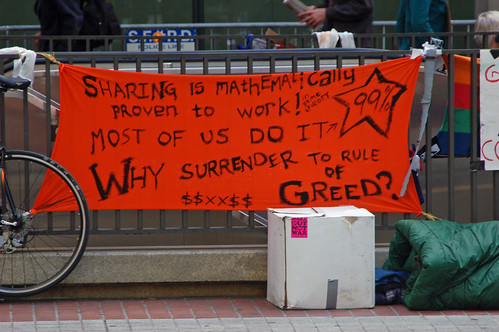
Apparently the San Francisco Police Department tore down the OccupySF encampment again last night. Story and video here.
For out of town folks, it may surprise to learn that the SFPD has a considerable history of brutality toward protesters; every once in awhile some inner demon overcomes discipline -- or perhaps the higher-ups turn it loose?
Supporters of the Occupy encampment will rally at City Hall today at 1:30 for the Board of Supervisors meeting.
UPDATE, October 19, 6:00 am: Stand off apparently. People spoke at the Board yesterday. Mayor Ed Lee said "no way" to encampment in the park. As of this morning, the encampment is in place ... To be continued, I'm sure.
Listen up, peace movement: Washington going rogue again?

One of the ways I keep from being overwhelmed by the media fire hose spewing an endless flood of "news" is that I ignore any story that seems on its face absurd or simply sensational. If it is really going to be worth knowing about, it will be around long enough so eventually I can catch the gist. Examples? It took me years to catch up with the rudiments of the stories of JonBenet Ramsey and Caylee Anthony. Nor have I kept up with the continuous drip of reports of stupidly conceived aspirational terror plots that usually seem to involve FBI informants and ridiculous "plans."
Naturally, I responded to Attorney General Holder's announcement of an Iranian Quds Force-Mexican drug cartel scheme to murder the Saudi Ambassador to Washington as just more of the same. The material the government has produced about the comic opera scenario seems to be full of holes. Foreign policy and intelligence pros reacted with strong skepticism.
As Adam Server points out,
Nothing to see here, right?The assassination was never going to take place. On Tuesday, FBI Director Robert Mueller described Iranian American Mansour Arbabsiar's alleged plot to assassinate the Saudi Ambassador to the United States as straight out of a "Hollywood script." In a sense he was right—because the plot was controlled from the beginning by the FBI.
Well, unhappily, this is not so easy.
What's all too visible is that the administration is sticking with its story and using the alleged plot to try to ratchet up international condemnation of Iran. That seems to me the important story: for whatever reason, the administration is willing to sell this crackpot story to push forward its Iran policy.
Now the Iranian regime frequently behaves badly. But so do our rulers. They don't care that nobody except those paid to believe what Washington says (for example, Saudi owned media, and core allies of the empire like the British government) seems to credit this conspiracy tale. The whole thing is reminding far too many more objective observers of a certain U.N. appearance by General Colin Powell in the run up to George W. Bush's Iraq invasion. Are Mexican drug cartels the new mobile chemical weapons labs? This certainly seems possible.
What's in this for the administration? Pre-election appeasement of the pro-Israel lobby? A nice little war scare that takes right-wing talking points off the 2012 agenda?. A rather desperate grab at an alternative reality in which Iran really is the isolated international pariah of Washington's imagination?
None of this makes much sense -- but neither did Bush's Iraq war. For months before that invasion, thoughtful people kept saying to each other something that amounted to "they wouldn't be that stupid." But they were.
We may be entering upon another such moment as the Obama administration's Iran policy limps along. Even as we condemn Wall Street greed and demand a jobs agenda, people who care about peace and national sanity need to keep an eye out for the real danger of yet another projection of U.S. power by leaders who can't seem to learn their lessons.
Monday, October 17, 2011
Iraqis to take their sovereignty back

So the United State's Iraq war and occupation will finally end this year. The military's pipe dream of keeping troops in the "independent" Iraq is not to be.
The U.S. signed an agreement to get out way back in 2008 under George W., but our generals and hawks always thought they'd somehow find an excuse to maintain U.S. forces in that unfortunate country. After all, now that we'd thoroughly trashed the place and touched off a civil war, they must still need our "help." Right?
Wrong. There's a bitter satisfaction that the ostensible reason why troops will now go turns on a question of law. The war was always an assault on legality itself, begun on the basis of made-up evidence of non-existent weapons without U.N. sanction. In a just world, our politicians might have found themselves hauled into a court, charged as were Nazi leaders with "making aggressive war." Now the U.S. military is departing because the Iraqis refuse to exempt their future behavior from prosecutions in Iraqi courts. Guess Iraqis want their country back, complete with the power to enforce their own laws.
Juan Cole explains:Iraqi leaders have adamantly refused to give U.S. troops immunity from prosecution in Iraqi courts, and the Americans have refused to stay without it.
It's hard to imagine a peaceful or happy future for this still war-torn country. But at least it will be Iraqis sorting it out. The U.S. is leaving, ignominiously.It turns out that the day on which the US military lost Iraq once and for all was September 16, 2007, when Blackwater private security guards, all decorated ex-military, opened fire in Nisoor Square under the mistaken impression that they were under attack by the ordinary civilian motorists there. 17 were killed, dozens wounded, and the incident became a cause celebre for Iraqis eager to see an end to a foreign military presence in their country. That the US courts declined to punish the perpetrators of the massacre was a nail in the coffin for extraterritoriality. The Iraqis wouldn’t grant it after all that.
... The US will receive no benefit from its illegal war of aggression, no permanent bases, no bulwark against Iran, no new Arab friend to Israel, no $14 a barrel petroleum– all thing things Washington had dreamed of. Dreams that turned out to be flimsy and unsubstantial and tragic.
Sunday, October 16, 2011
Incongruous food marketing in the Mission

One of the minor mysteries of the current time is that my local Walgreens drug store (a huge branch of a national chain) has remodeled its entrance so that it now proclaims itself a place to buy groceries. The sign above dominates the front (only) entrance.

Inside bright refrigerated counters display prepared convenience meals that look reasonably edible for the genre -- perhaps of the same quality as in an airport. Prices are similar to an airport's as well.

Walgreens accepts food stamps.

There's a good sized aisle of ordinary canned and packaged foods, also priced at the high end for such goods.

At check out, there are a few sad looking durable fruits ...

With these signs scattered about, it is hard not to think that Walgreens wants to be your grocery store.
The corporation explains its move into the food business like this:
Nice echo of Michele Obama's crusade for wider availability of healthy food in poor neighborhoods there.Walgreens is targeting markets where access to produce and other goods can be hard-to-find. Across the chain, it’s already selling a wider variety of food and household goods in an effort to reach shoppers looking for convenience.
The company’s goal: to be a one-stop shop for healthy living.
Now I'm far from a food snob. My political stance about food has always been simple: everyone should have some.
I can even imagine buying and eating some of the Walgreens stuff in a pinch -- in fact, during the last three weeks when we've been without a kitchen or even a coherent living space because of remodeling, we've picked up a few items there.
But I remain bemused. The Mission is not a food desert. Across street from this Walgreens is one of our numerous small produce markets that stock genuinely fresh fruits and veggies. Just around the corner there's a thriving weekly farmers market. We've already got more cheap convenience than most people. On the street and in storefronts, it is easy to buy hot dogs, tacos, and pupusas for well under $5 for a meal. True, the nearest conventional U.S. super market is many blocks away, but food is plentiful and much of it is cheap.
I have to wonder whether there is really a niche in this neighborhood for Walgreens to fill. Hard pressed working immigrants who actually cook almost certainly have figured out how to buy bulk staples occasionally at somewhere like Costco or Food for Less (no more than 10 blocks away).
Walgreens must intend to use its huge size to undercut the local merchants. Those milk and bread prices do trump the neighborhood stores; corporate volume buying can do that. But in this 'hood, the chain drug store doesn't really offer a convenience advantage. Time will tell whether this food marketing experiment works.
This post is a contribution to international Blog Action Day, a worldwide conversation about food. As I said above: everyone should have some!
Saturday, October 15, 2011
Saturday scenes and scenery: Road rage

I thought this might have serious consequences.
The driver of the red car was threading his way down the street and apparently brushed too close to the cyclist. When I first saw them, the bicycle guy was riding alongside the red car, screaming into the window: "I've got a right to the lane too."
I couldn't hear what the driver said in return, except that he seemed angry.
The cyclist threw down his bike where you see it here; the driver got out of his car. They stepped toward each other.
They yelled at each other -- then quite suddenly they seemed to become aware of the spectacle they were making and stepped back.
All this happened in the middle of a street where parents were dropping off children outside Horace Mann Middle School. Traffic becomes snarled here morning and evening as vehicles and pedestrians compete for terrain. It's a mess. Because of declining school funding, the district is doing away with school buses, so we can only expect this situation to get worse.
Friday, October 14, 2011
Presidential horserace commentary

I know, nobody needs any more of it. We're already drowning in the quadrennial drivel. The Republicans offer a circus of crazy and that's on their good days, when they rise above merely ignorant and mean. The Prez remains mired in an economy whose winners he chose not to piss off; if he is saved, it will be a not entirely welcome byproduct of the energies unleashed by people in the streets.
Still, I'm not going to skip commenting on the some of the comments of the commentariat, observations that seem worth drawing out.
Race still matters.
At Talking Points Memo, Josh Marshall and friends are chewing over the sudden collapse of Rick Perry in Republican polls.
In the Republican base, it is impossible to overestimate the degree to which fear that the Others are taking over drives political choices. They know they can't just proclaim that all those Black and Brown people with funny names are not Americans. They will applaud members of the Other who play the talking dog role, who offer them cover for their fear -- hence the Herman Cain bubble. But in their guts they can't accept the browning of the United States.As Governor of border state, Perry has needed to take a more pragmatic approach to illegal immigration than is considered acceptable among GOP voters in other states. But the biggest mistake Perry made, the knock-out punch he delivered to himself, was calling his critics of denying in-state aid to children of illegal immigrants "heartless." To conservatives that just sounded way too close to "bleeding heart liberal" territory for comfort, and it killed him, and that was the point where he really took a nose dive in the polls.
Why has Obama administration so badly flubbed the politics of governing?
That's been my core question ever since the spring of 2009: how could a politician and his people who had shown such a deft touch for campaigning as to put a Black man in the White House be so flat footed in office? A Washington Post correspondent, Scott Wilson, asked a similar question:
Wilson's answer, stated in less politic terms, is the same as mine: YES. Obama and his people are at best benign technocrats who perceive themselves as smarter and better able to govern than the masses who put them there. Wilson emphasizes that the Prez himself is a thoughtful loner, not a people person. I can easily imagine that being "Obama" simply drains him. But the result is deeply anti-democratic, oblivious to the passions at work in the land. And people react to that. Let's hope that being sent out to stump for reelection reminds the Democratic Party establishment that doing politics is governing.Is it possible to be America’s most popular politician and not be very good at American politics?
Religion still matters.
I find James Fallows' blog consistently thought provoking and informative. But in this snippet about the Romney campaign, I think he's just wrong.
It's a convention of our politics that aspirant office holders must have a religious affiliation. I think that's unfortunate -- there are plenty of ethical people without religion or with only vague religious ties -- but it is there. But since we demand of these people that they have a religion, then we naturally examine how they relate to the flavor of religion they claim. It's one of the ways we assess whether we trust them. After all, far more of us are equipped to think about how religion shapes our choices than about whether a pol has good plan to fund health care or reduce carbon emissions. So we want to know whether the stances of their churches form their characters and how they deal with the challenge of squaring church positions with a pluralistic democratic society.But for people to come out and say that they won't back a candidate because he's Mormon and therefore a "cult" member is no better than saying "I'd never trust a Jew" or "a black could never do the job" or "women should stay in their place" or "Latinos? Let 'em go back home." Maybe it makes things more "honest" for people to be open about their anti-Mormonism and discreet about other prejudices. ... Still, it's bigotry.
Romney is up against anti-Mormonism of several sorts. Among a certain kind of Christian, he a born member of a heretical sect that crashes the Christian party. I think that is sort of anti-Mormonism that Fallows is talking about. It does look like bigotry if you doubt that particular faith affirmations such as getting your words about Jesus "right" is the key to eternal life.
But I don't think it is bigoted to ask of Romney (or any politician) whether he is down with the official stances of the religious body he claims. His Church of the Latter Day Saints is vigorously engaged in preventing civil society from recognizing gay marriage. The LDS supports of an idealized patriarchal family that scarcely exists. How does Romney relate to that? If he can't manage to adequately affirm that good people live among us who organize family differently, he's got a flaw as a Presidential aspirant. In this, he's no different from Catholic pols: it is fair to ask them how they deal with Church teachings, some opposed by most liberals like wanting to outlaw reproductive choice, others strongly affirmed like opposition to the death penalty or hospitality toward immigrants. The public has the right to know. Heck, the public has a right to know what politicians mean by their claimed faith, even if it is some kind of vague generic Protestant Christianity that still passes for "normal" in our civic life.
So long as we demand religious affiliation of politicians, it's not bigotry to ask what they mean by it. And if we don't like their answers, it is not bigotry to say so.
Thursday, October 13, 2011
Some of the 99 percent march on Wells Fargo
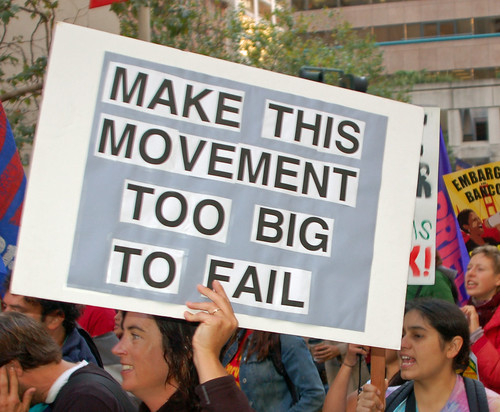
A good sized crowd, maybe approaching 1000 people, marched from the OccupySF encampment in front of the Federal Reserve building at 101 Market to Wells Fargo's California Street headquarters Wednesday morning.
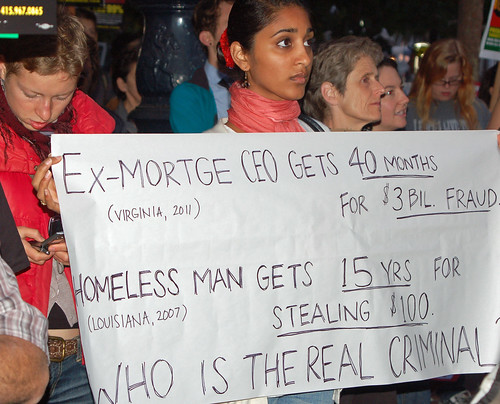
Banks are unpopular, but it takes some organizing to draw a good crowd for a march at that hour. Local community organizations and the more activist bits of the labor movement -- including Causa Justa/Just Cause, POWER, Young Workers United, the Chinese Progressive Association and Unite Here Local 2850, CNA, the teachers -- pulled this event together.
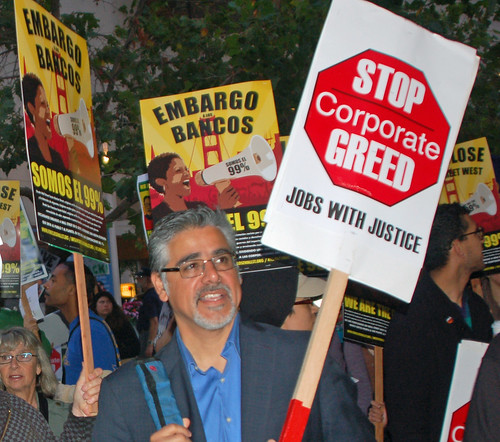
Mayoral candidate John Avalos represented the political class.
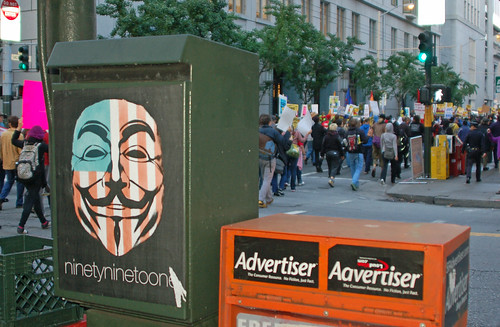
People took the street in the dim canyons of the financial district ...

... while a copter hovered above.
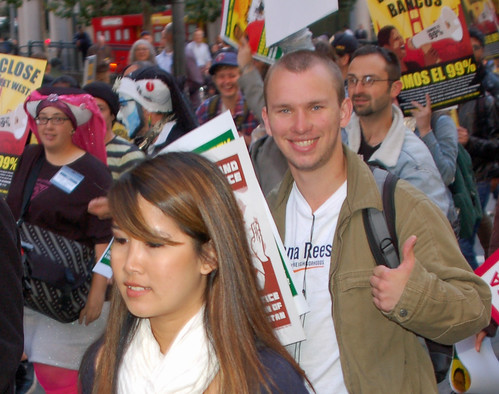
If you haven't been in one of these things, you might not know that folks can be both fighting mad and happy to be together while demonstrating. The experience of solidarity does that.
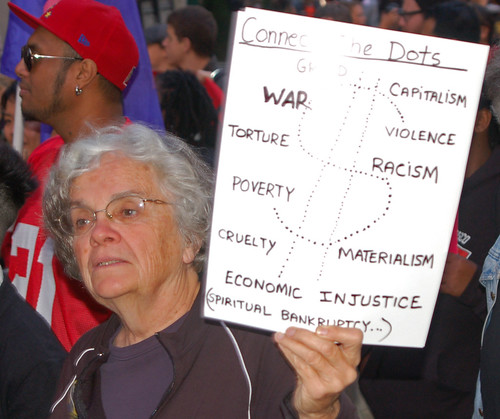
Solidarity is about knowing we're all in the 99 percent together.
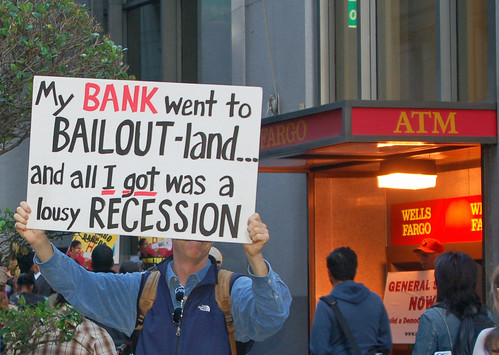
At the Wells Fargo location, groups fanned out to all the entrances.
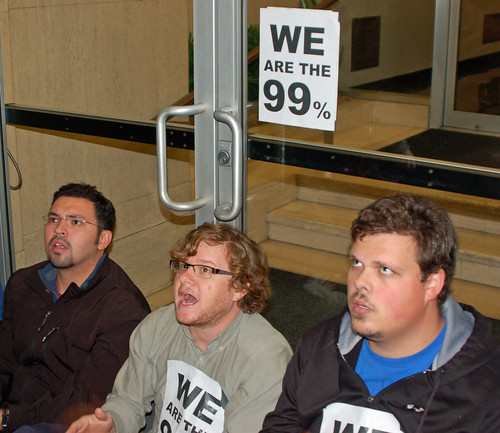
These protesters blocked a door in an alley. A cop warned them, asking them to move.
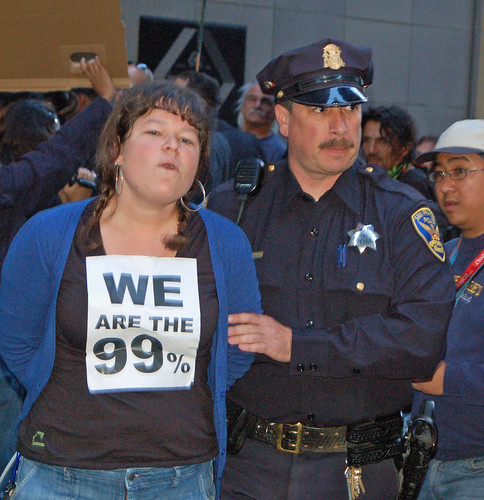
The bank wanted the entrance open, so police took a few away. They were cited and released.
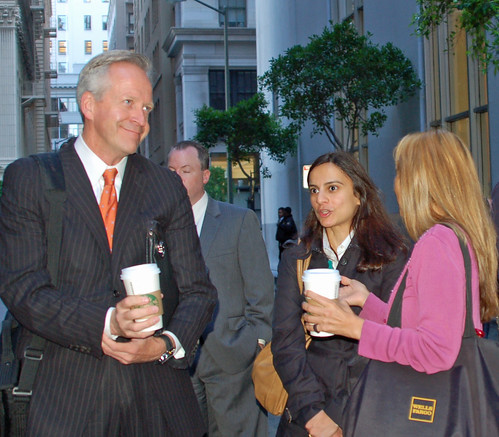
These bank employees waiting for a door to be cleared tried to make light of their visitors, but do I see some anxiety? At that early hour, they are more likely to be part of the 99 percent who are getting screwed, but not everyone knows that.
Movements are broad, collective mobilizations, often arising spontaneously in response to injustice. They are vital in giving voice to the voiceless.
Campaigns are organized, have institutional capacity and adopt specific goals and targets. If well-designed and thought through, campaigns can harness the energy and power of a movement to achieve specific goals.
Examples of great campaigns that harnessed movements against injustice, and achieved transformative change, include the movements to abolish slavery, to win the vote for women, to expand civil and political rights to African-Americans, and in this case, to “Drop the Debt.”
